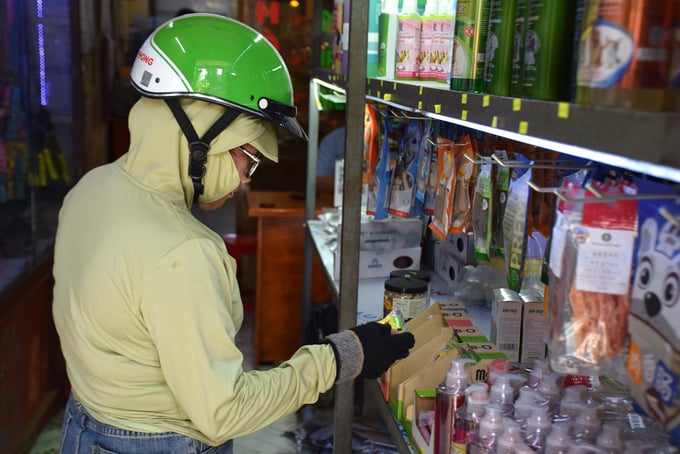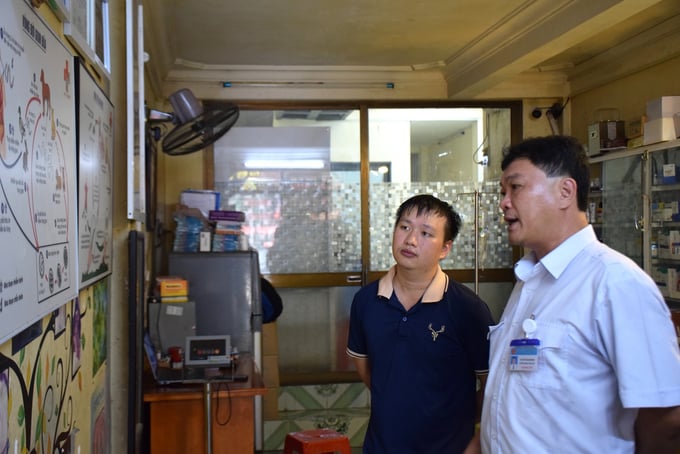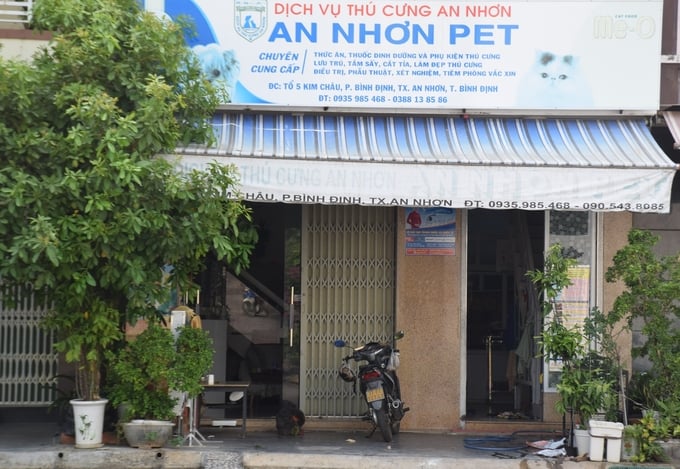May 30, 2025 | 17:52 GMT +7
May 30, 2025 | 17:52 GMT +7
Hotline: 0913.378.918
May 30, 2025 | 17:52 GMT +7
Hotline: 0913.378.918

A customer purchasing pet food and shampoo at the Quang Dung Pet Clinic in Quy Nhon city, Binh Dinh province. Photo: V.D.T.
According to Mr. Huynh Ngoc Diep, General Director of the Binh Dinh province's Sub-Department of Livestock Production and Animal Health, the presence of pets in Quy Nhon city has increased significantly in the last few years, albeit at a slower pace compared to that in Ho Chi Minh City, Hanoi, and Da Nang
Consequently, the uptick in pet ownership has spurred the development of pet clinics and grooming services in the province. Binh Dinh province currently houses nearly 20 pet clinics, half of which is located in Quy Nhon city.
As pet ownership continues to rise, there is a growing demand for specialized services catering to their unique care needs. For instance, dogs can be adorned with striking accessories such as bells and collars, and don fashionable attire. They may also enjoy a lavish diet consisting of several sausages per day, along with a few ribs or chicken thighs per week. Additionally, they are taken to grooming services weekly for bathing, nail trimming, hair dyeing, and ear dyeing.
When pet owners leave on extended vacations or business trips, their pets are often entrusted to boarding services for accommodation. Notably, facilities with expansive land areas even operate as 'pet hotels'.

Mr. Nguyen Thanh Binh (right), Head of the Department of Livestock Production under the Binh Dinh province's Sub-Department of Livestock Production and Animal Health, in a discussion with Mr. Nguyen Xuan Hoang, a specialist in pet grooming at the Quang Dung Pet Clinic. Photo: V.D.T.
"At these facilities, pets receive care and meals similar to their daily routines at home. In the evening, dogs sleep in air-conditioned rooms and listen to instrumental music. During the day, they are taken for walks by service staff to soak up the sun; all of these services are offered at a considerable cost. Even small pet care establishments have a few boarding rooms to accomodate pets during medical treatment," Mr. Huynh Ngoc Diep added.
An Nhon town is witnessing a surge in the pet ownership movement, which prompted the establishment of four pet care facilities. In addition to basic amenities such as food, supplements, and accessories, these facilities provide accomodation, grooming, and beauty services. On the other hand, they cater to medical needs by offering treatment, surgery, testing, and vaccination services for pets.
According to Mr. Huynh Van Thanh, a veterinary officer at An Nhon town's Agricultural Service Center, the four local pet care facilities focus on providing bathing, grooming, nail trimming, among other services. However, only two of these facilities are equipped with the necessary, albeit inadequate, machinery and equipment for medical treatment. Regarding surgery, these facilities primarily specialize in performing minor procedures; they are not equipped to handle major surgical operations such as bone fractures or joint replacements for pets.
Mr. Huynh Ngoc Diep highlighted that the most commonly raised pets in Binh Dinh province are dogs and cats. The most popular dog breeds include Poodle, Golden Retriever, Rottweiler, Phu Quoc Ridgeback, and Pitbull; popular cat breeds include Siamese, British Shorthair, and Persian cats.
According to Mr. Diep, dogs are particularly susceptible to diseases caused by bacteria and viruses. Bacterial infections are relatively easy to treat, whereas viral diseases pose a challenge due to the lack of specific medications. The only treatment currently available for viral diseases is to enhance the pet's immune system, thereby allowing them to recover on their own.

An Nhon PET pet care center in Kim Chau, Binh Dinh ward, An Nhon town, Binh Dinh province. Photo: V.D.T.
"Viral diseases include hepatitis, canine distemper, parvovirus, with rabies being the most dangerous. Raising a dog requires considerable expenses; vaccines for parvovirus and distemper come in 5-in-1 or 3-in-1 doses, and each injection can cost hundreds of thousands of dong.
People might spend three million dong to buy a dog, yet they would neglect to vaccinate them against rabies, despite the low cost of just 30,000 to 50,000 dong per dose. It is only when a dog bites someone and they need to get vaccinated that the costs escalate to millions of dong," Mr. Diep shared.
"Rabies vaccination for dogs in Binh Dinh province is socialized. Every year, the local government launches a rabies vaccination campaign, and pet owners register their animals for vaccination. The heads of neighborhoods and towns compile a list; the local government sets up a vaccination point, and schedule a date for pet owners to bring their animals for vaccination by local veterinary officers," shared Mr. Nguyen Thanh Binh, Head of the Department of Livestock Production under the Binh Dinh province's Sub-Department of Livestock Production and Animal Health.
Translated by Nguyen Hai Long

(VAN) Vaccinating juvenile pangasius helps reduce disease, antibiotic use, and farming costs, increasing profits for export-oriented farmers in An Giang.

(VAN) Due to a limited supply of workforce and competitive recruitment requirements, businesses struggle to retain talented veterinary human resources.

(VAN) WOAH’s guidance aims to mitigate disease risks through a One Health approach that balances economic, conservation, and public health interests.

(VAN) Ms. Nguyen Thi Dung, Deputy Director of Ngoc Hoang Cooperative, shared about the journey of bringing dragon fruit to Europe, achieving annual revenues in the billions of VND.

(VAN) Bamboo products from Thang Tho Bamboo Cooperative have reached many countries around the world, while also creating jobs for local workers.

(VAN) The Management Board of Con Dao National Park reported that a green sea turtle, tagged in the Philippines, has traveled thousands of kilometers to lay 84 eggs on Bay Canh Islet.

(VAN) Green technology is paving a new path for sustainable aquaculture in the Mekong Delta in particular and across the country in general, helping reduce emissions and adapt to climate change.